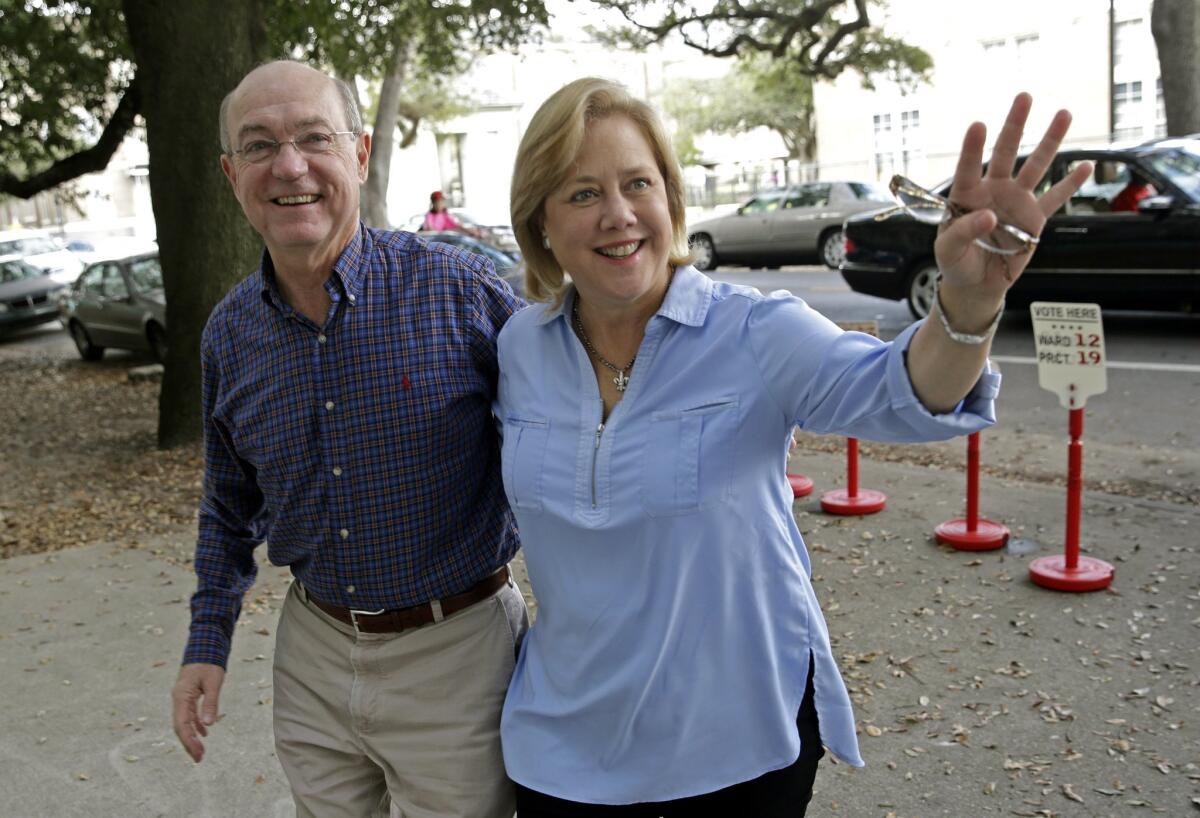Louisiana voters decide fate of Mary Landrieu, and Democrats in South

- Share via
Reporting from New Orleans — Louisiana voters trooped to the polls on a sodden Saturday with history on their ballots. At stake: whether to reelect the last Democratic U.S. senator left in the Deep South and, in a classic echo of the state’s picaresque political past, if a criminally tainted ex-governor deserves redemption and a seat in Congress.
Rep. Bill Cassidy, 57, a three-term incumbent from Baton Rouge, was a heavy favorite to oust Democratic Sen. Mary Landrieu, 59, in a runoff forced Nov. 4 when neither candidate captured the majority needed to win outright.
A victory would give Republicans a gain of nine Senate seats this banner election year, more than enough to take control of the chamber starting in January.
It would also mark a serious blow to one of the dynastic families of Louisiana politics; Landrieu’s brother, Mitch, is New Orleans mayor, a position held by their father, “Moon,” in the 1970s.
Accustomed to entering election day behind in polls, Sen. Landrieu insisted she would rally as she had before. “It’s routine for me,” Landrieu said Friday as she wound up a statewide tour. “I have every expectation of winning.”
Another legacy candidate, Edwin Edwards, was vying to fill Cassidy’s vacated central Louisiana seat, an improbable comeback attempt—at age 87—for one of the state’s most colorful and controversial politicians.
The former four-term Democratic governor served more than eight years in federal prison for fraud, racketeering and extortion in connection with the licensing of riverboat casinos. He left prison in 2011 and co-starred, briefly, in a cable reality show focused on his pen-pal-turned-third-wife, Trina Scott.
In another House race Saturday, voters were replacing Republican Rep. Vance McAllister, who failed to make the runoff after a surveillance video captured him kissing a former aide.
Saturday’s marquee race, loosely speaking, was the U.S. Senate contest, but that lost most of its national luster with the Republican romp on Nov. 4. Overnight, the contest here became largely a political afterthought, save in Louisiana.
In one sign of uninterest, and cold calculation, the Democrats’ Senate campaign arm essentially wrote the race off, looking ahead to the more promising political map in 2016 and leaving Landrieu, a three-term incumbent, struggling on her own against an avalanche of uncontested negative ads.
Still, the contest carried heavy symbolic weight.
Landrieu is one of a dying breed, a white Southern Democrat holding federal office, and she was fighting not just Cassidy, a lackluster opponent who largely ducked public appearances, but decades-long forces that have transformed the region from a Democratic stronghold to arguably the most zealously Republican redoubt in the nation.
The realignment started as a backlash to the 1960s civil rights movement, hastened under the genial conservatism of Ronald Reagan and sped up even more with the election of President Obama, who is deeply disliked by many white Southern voters.
The results have been stark. A Landrieu defeat would mean Democrats controlled not a single governorship, U.S. Senate seat, or legislative chamber from the Carolinas to Texas. It would also leave Democrats with just three U.S senators among 22 representing the states of the old Confederacy: two from Virginia and one from Florida, the least-typical of Southern states.
Fighting for survival, Landrieu distanced herself from her national party—as well as Obama—focusing on local issues and, in particular, the benefits she has brought the state, most recently as chairman of the Energy and Natural Resources Committee, an important post for the state’s economically crucial oil and gas industry.
She rested her hopes in the final days on a fresh controversy surrounding payments Cassidy, a physician, received from Louisiana State University’s medical school, citing a lack of proper accounting and suggesting criminal fraud. Cassidy said the payments were for part-time teaching and medical work he has done while in Congress and insisted there was nothing wrong with the arrangement
His campaign was straightforward: depicting Landrieu as a rubber stamp for Obama, a strategy used to great effect by Republicans across the country, helping the party knock off more than twice as many Senate Democrats this election as they had in the previous 10 years combined.
In the House races, Edwards faced a steep uphill climb against Republican Garret Graves, a former advisor to Gov. Bobby Jindal, who benefited not just from the Democrat’s scandalous past but the central Louisiana district’s heavy GOP registration.
In Saturday’s other House contest, Republican physician Ralph Abraham was expected to easily dispatch Democratic Monroe Mayor Jamie Mayo in another strongly Republican district in the northeast part of the state.
Neither contest was expected to affect the balance of power in the House, where Republicans will start the next Congress with a commanding majority.
Twitter: @markzbarabak
More to Read
Get the L.A. Times Politics newsletter
Deeply reported insights into legislation, politics and policy from Sacramento, Washington and beyond. In your inbox three times per week.
You may occasionally receive promotional content from the Los Angeles Times.











